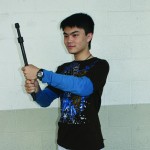
By LIA VILLAR
Not knowing the traditions or influences the United States is built upon can create barriers for numerous immigrating families.
Junior ShuTong Zhang experienced barriers after leaving the populous country of 1.3 billion people in China and coming to the United States. His way of life changed drastically as he adjusted to American values and an increased emphasis on pop culture.
“I was 10-years-old when I left China. My home country is very big and it’s crowded, very populous. We have a really ancient history and also we have a lot of traditions and festivals. China has a lot more tradition influencing us than pop culture,” Zhang said.
Above of all other traditions, the brilliant environment of Chinese New Year is filled with colors of red and gold and is a tremendous celebration in China.
“Chinese New Year is the most important holiday of the year. It’s celebrated like Christmas in America where people and families gather together to wish for good luck and good fortune,” Zhang said.
Preparing for Chinese New Year requires people to take weeks off of work to prepare for the holiday. Both men and women receive haircuts before the New Year, believing it will deliver good fortune and if not cut, bring them bad luck.
“My family, mainly my mom and I, make dumplings [for Chinese New Year but since] my family is really westernized, we don’t really practice the traditions,” Zhang said.
South of China, having a population of 86.9 million, freshman Huong Dang left Vietnam when she was eight years old.
“In Vietnam, there is a vibrant atmosphere. Vietnam is hotter [than Florida]. In the evening people [will] crowd around downtown and there [are] food carts everywhere selling soy milk or fried rice,” Dang said.
Accompanying their vibrant atmosphere, Vietnam’s lively festival, Tet, means the first morning of the first day of the new year and lasts for three days. Cleaning is frowned upon during Tet, in fear that families will sweep out the good luck. Traditional foods such as earth cake, a square cake made with rice beans and pork, and several different desserts made with coconut are offered during the festivities. Like Chinese New Year, Tet honors the year of the dragon, celebrated on January 23.
With both China and Vietnam celebrating New Years for good fortune, they both have a strong link to the Confucian philosophy. Children are educated to respect their elders and value education.
“My family believes that school should be well disciplined. In China, our school was the most important aspect of our lives. We didn’t have time to hangout with friends because we had a lot of homework to do. American education is very liberal [because] we get to choose what classes we want to take,” Zhang said.
Unlike students in American schools, who are only required to go five times a week, in China, children attend school six days a week from early morning, about 7 a.m., to at least 4 p.m. Even though all children are able to go to primary school and middle school for free, parents are still required to pay for uniforms and books. If the child intends on furthering his education, parents must pay for public high school.
“[My family came to America] in search of better living conditions. We were in poverty. [Our house was] very old, the paint was chipped and there were seven people living in one house [with] one bathroom and no air conditioning. [My parents] hope [by coming to America] that I’ll get into a better college and [find] a good job here,” Dang said.
Along with putting education as a priority, stereotypes develop toward Zhang and Dang, labeling them as smart because they are Asian. But despite the stereotypes, both Dang’s and Zhang’s cultures have influenced their ways of life.
“I hear people say that I get good grades because I’m Asian, [but] success can only be achieved through hard work. [That’s what my culture has] taught me, to do the best I can to succeed and to value education,” Zhang said.